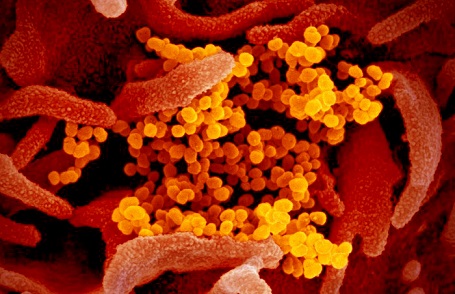Nikhil Prasad Fact checked by:Thailand Medical News Team Oct 10, 2024 6 months, 2 weeks, 2 days, 9 hours, 50 minutes ago
Medical News: Researchers from Hangzhou City University and Zhejiang Normal University in China have uncovered a new mechanism used by the SARS-CoV-2 virus to evade the body’s immune defenses. The findings may offer fresh opportunities for developing treatments that target this viral strategy.
 SARS-CoV-2 N protein weakens immune defense by blocking GADD34
The Study and Its Focus
SARS-CoV-2 N protein weakens immune defense by blocking GADD34
The Study and Its Focus
This
Medical News report highlights a study focusing on how the SARS-CoV-2 nucleocapsid (N) protein disrupts an essential immune response. Researchers have long known that when the body detects viruses, its first line of defense is the innate immune system. This defense relies on a complex process involving proteins and pathways that signal the presence of an invader, prompting the immune system to act swiftly.
One key protein involved in the body's immune response is GADD34, which plays a significant role in helping the body respond to stress during viral infections. The team behind this study wanted to explore how the virus might be undermining this protein's function to continue its replication without interruption.
The Role of Stress Granules in Immunity
When viruses invade, the body creates structures called stress granules (SGs), which are clusters of proteins and mRNA that help halt viral replication. In a typical scenario, SGs assist in recruiting proteins that trigger the immune system, leading to the production of interferon, a key player in antiviral defense. However, viruses like SARS-CoV-2 have developed ways to bypass this system.
The research team found that the nucleocapsid protein in SARS-CoV-2 creates atypical stress granules that do not follow the usual pathway of helping the immune response. Instead, these atypical granules assist the virus by disrupting the normal immune signaling that would otherwise block viral replication.
GADD34 Suppression: A Key Discovery
The study’s main discovery revolves around how the SARS-CoV-2 nucleocapsid protein blocks GADD34, a protein vital to the immune response. Normally, GADD34 helps the body recover from viral infections by encouraging the production of interferons. Interferons are proteins that signal the immune system to attack the virus.
However, the nucleocapsid protein interferes with the process by preventing GADD34 from functioning properly. The viral protein binds to GADD34 mRNA, effectively sequestering it within these abnormal stress granules. This prevents the translation of GADD34 into a functional protein, weakening the immune response and allowing the virus to continue replicating within the host.
How the Virus Uses This Mechanism
The SARS-CoV-2 nucleocapsid protein has a clever way of promoting its own replication. By disrupting GADD34’s function, the virus manages to reduce the body's ability to fight back. In normal situations, GADD34 helps activate interferon regulatory factor 3 (IRF3), a protein that en
ters the cell nucleus to trigger the production of interferons. But with GADD34 impaired, IRF3 cannot function correctly, which compromises the immune response and leaves the virus free to replicate.
The study also revealed that the viral nucleocapsid protein can hinder IRF3's movement into the cell nucleus, further disabling the immune response. This dual strategy of disrupting both GADD34 and IRF3 represents a significant finding, showing how deeply the virus interferes with the body's defense mechanisms.
Potential for Therapeutic Applications
The research highlights the importance of GADD34 in fighting viral infections and suggests that therapies aimed at restoring its function could prove effective against SARS-CoV-2. If scientists can develop treatments that prevent the nucleocapsid protein from blocking GADD34, the body’s immune system might have a better chance of halting the virus's replication early in the infection process.
By understanding this mechanism, future therapies could focus on supporting the body's innate immune response or even directly blocking the nucleocapsid protein’s interaction with GADD34. This approach could be a promising avenue for developing antiviral treatments that are more effective in fighting not only SARS-CoV-2 but potentially other viruses that use similar strategies.
Study Conclusions
The study’s findings provide new insights into the mechanisms SARS-CoV-2 uses to evade the immune system. The viral nucleocapsid protein interferes with a crucial pathway that involves the protein GADD34, which plays a vital role in helping the immune system produce interferons. By blocking this pathway, the virus can replicate more easily within the host, worsening the infection.
The discovery of this mechanism opens the door for new treatment possibilities. Targeting the interaction between the nucleocapsid protein and GADD34 could be key to developing antiviral drugs that better support the immune system’s natural ability to fight off SARS-CoV-2. As the global effort to understand and combat COVID-19 continues, this study provides valuable knowledge that could aid in the development of more effective treatments.
The study findings were published in the peer-reviewed journal: Molecules.
https://www.mdpi.com/1420-3049/29/20/4792
For the latest COVID-19 News, keep on logging to Thailand
Medical News.
Read Also:
https://www.thailandmedical.news/news/study-reveals-the-sars-cov-2-spike-protein-interacts-with-over-60,000-host-proteins-and-may-trigger-carcinogenesis
https://www.thailandmedical.news/news/breaking-evidence-found-that-sars-cov-2-even-delves-into-the-skull-bones-of-those-infected
